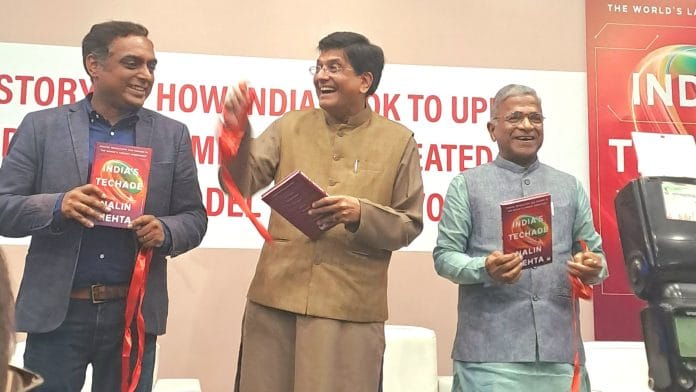New Delhi: On the sixth anniversary of Digital India, Prime Minister Narendra Modi lauded the country’s “passion for innovation” at a virtual conference with the scheme’s beneficiaries. India’s data and demographic dividend, combined with its unparalleled technical prowess, would lead to this decade becoming the nation’s “techade”, he had said.
This was two years ago.
Modi’s words were recently brought to life at a packed hall witnessing the launch of former journalist Nalin Mehta’s book, India’s Techade: Digital Revolution and Change in the World’s Largest Democracy, at New Delhi’s India International Centre.
Commerce and industry minister Piyush Goyal cited Padman, the critically acclaimed 2019 film where a young man named Lakshmi develops cheap sanitary napkins to ease women’s menstruation troubles, to show that “India and Indians know how to use technology”— a premise that was central to Mehta’s book and its launch event.
Enhancing governance with tech
The session with Goyal was a praise-fest for India’s remarkable tech and digital advancements – its surging IT industry, software exports, and startup ecosystem. Initiatives like Digital India have fostered digital literacy, e-governance, and internet penetration, driving economic growth, innovation, and societal transformation and positioning India as a global digital powerhouse.
The JAM trinity – Jan Dhan, Aadhaar and Mobile – used to promote financial inclusion and tackle subsidy issues, was one of the initiatives discussed in detail in Goyal’s session. The synergy between the three ensures efficient subsidy management; funds flow directly to Aadhaar-linked bank accounts, curbing corruption and benefiting intended recipients.
The hall conceded that JAM minimises corruption, streamlines subsidies, and broadens financial inclusion, transforming India’s subsidy landscape. Goyal proudly cited Modi’s Independence Day speech as an example, where the latter mentioned revoking welfare support for 10 crore “fake beneficiaries”. Goyal credited the government’s “innovative use” of digital technologies such as geo-mapping and geo-tagging to optimise businesses, enhance governance, and improve the lives of citizens.
Also read: You thought Indian UPI app BHIM is a homage to Mahabharata’s Bheem? It’s actually Ambedkar
‘Fire in the belly’
The young population is “driven by a fire in the belly,” not for food but for the “finer things of life,” said Goyal while addressing the audience. India’s foray into the digital world has revved up its entrepreneurial spirit, so much so that even peddlers and hawkers accept digital payments today to support their businesses and increase their credit ratings, he added.
With parent-like pride and awe, Goyal mentioned a dosa seller in Mumbai’s Ghatkopar who sells about 300 dosas for Rs 300 each daily. The vendor only accepts UPI payments for fast, easy and secure transactions, Goyal said, and he runs out of supply before the demand does.
Democratisation of technology
Vijay Shekhar Sharma, founder of Paytm, one of India’s topmost digital payments platforms, was also part of an all-male panel that excitedly discussed the country’s fintech sector after Goyal’s session.
Reminiscing his tête-à-tête with TCS founder F.C. Kohli, Sharma revealed the legendary industrialist’s views on India’s IT development. India couldn’t do what countries like Japan or Germany could do then because “its computer revolution was Englishised.” India never even pursued Microsoft Office in a regional language, he added.
As Kohli predicted all those years ago, language is the primary means to take technology to the masses, said Sharma. This is greatly utilised by the Indian microblogging site Koo, whose co-founder Aprameya Radhakrishna was also among the panellists.
Radhakrishna disclosed that 80 per cent of his platform is focused on languages. The flow of the app allows users to translate their blogs into multiple languages. Interestingly, even Brazilian President Luiz Inácio Lula da Silva uses Koo, translating his thoughts into Hindi and building an influence in India’s Hindi heartland. Lula has “a network in cities like Indore, Lucknow and Kanpur, and no one in India even knows,” he quipped.
According to Radhakrishna, every country needs a local version of social media, and he revealed plans for providing it as a “global service”. The idea is to customise the interface as per domestic social media rules. “Going deeper into India and going global with the same platform is next on Koo’s plate,” he declared.
However, an audience member’s witty observation left the hall in splits and ended the session on an ironic note: For all the talks about geo-tagging and geo-mapping, there was “not a single mention of Jio”.
(Edited by Zoya Bhatti)






